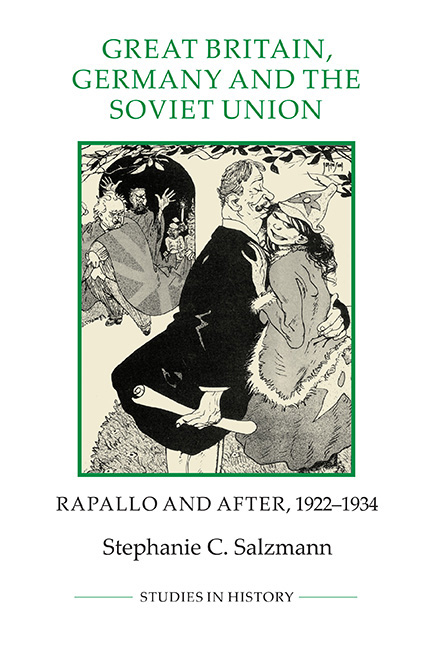Book contents
- Frontmatter
- Contents
- Acknowledgements
- Abbreviations
- Introduction
- 1 ‘It Nearly Overthrew the Applecart’: Lloyd George and the Treaty of Rapallo
- 2 ‘The Most Important Event Since the Armistice’: The Foreign Office and Rapallo
- 3 Rapallo's First Test: The Ruhr Crisis
- 4 The Policy of Conciliation: Rapallo and the First Labour Government
- 5 The Battle for the German Soul: Locarno and the Treaty of Berlin
- 6 Rapallo and the Rupture of Anglo-Soviet Relations
- 7 Rapallo and the Decline of the Locarno Spirit
- 8 An Economic Rapallo?
- 9 Rapallo and the Disarmament Conference
- 10 The Rapallo Relationship and Hitler's Rise to Power
- 11 The End of Rapallo: The German–Polish Non-Aggression Treaty
- Conclusion
- Bibliography
- Index
1 - ‘It Nearly Overthrew the Applecart’: Lloyd George and the Treaty of Rapallo
Published online by Cambridge University Press: 29 April 2017
- Frontmatter
- Contents
- Acknowledgements
- Abbreviations
- Introduction
- 1 ‘It Nearly Overthrew the Applecart’: Lloyd George and the Treaty of Rapallo
- 2 ‘The Most Important Event Since the Armistice’: The Foreign Office and Rapallo
- 3 Rapallo's First Test: The Ruhr Crisis
- 4 The Policy of Conciliation: Rapallo and the First Labour Government
- 5 The Battle for the German Soul: Locarno and the Treaty of Berlin
- 6 Rapallo and the Rupture of Anglo-Soviet Relations
- 7 Rapallo and the Decline of the Locarno Spirit
- 8 An Economic Rapallo?
- 9 Rapallo and the Disarmament Conference
- 10 The Rapallo Relationship and Hitler's Rise to Power
- 11 The End of Rapallo: The German–Polish Non-Aggression Treaty
- Conclusion
- Bibliography
- Index
Summary
Genoa, Easter Monday, 17 April 1922. The news of the treaty of Rapallo exploded like a bombshell. The bilateral Russo-German agreement had been secretly concluded during the World Economic Conference the previous day. The surprise was immense, as was the anger among the participants of the conference. Would all efforts for an international co-operation to solve the post-war political and economic problems now be in vain? Had they assembled in Genoa for nothing?
David Lloyd George, the British prime minister, was particularly angry and bewildered about the German–Russian coup de surprise. Indeed, he almost regarded it as a personal defeat. Not only was this a major blow to ‘his’ conference, but it endangered his long-term political objectives of ‘taming’ Bolshevik Russia, and was a heavy set-back to the attempts to improve his personal image at home. During a dinner at the Hôtel de Gênes on 17 April he bitterly asked the German secretary of state, Hirsch, why this treaty had not been signed either three weeks before or after the conference, given that then the agreement would have been irrelevant and he urged the Germans to withdraw from the agreement. Nevertheless, his annoyance lasted only three days. During a press conference on 20 April he announced that the crisis was over. The conference returned to normal as far as this was possible after Rapallo. Only the Germans were excluded from all further meetings of the first commission which was dealing with the Russian question.
Lloyd George's surprise upon learning about the Rapallo treaty on the afternoon of Easter Monday was genuine. His confidant and adviser on Russian affairs, E. J. Wise, had not informed him about a conversation during which Ago von Maltzan, head of the Eastern desk of the Wilhelmstraße (the German Foreign Ministry) and member of the German delegation had mentioned German reasons for an agreement with Moscow. Yet a German–Russian agreement as such did not come entirely out of the blue for the British prime minister. From the available sources it cannot be determined to what extent Lloyd George was aware of the information received by the Foreign Office about the extent of German–Russian co-operation prior to Genoa. However, in his famous Fontainebleau memorandum during the Paris peace conference, he had already warned that Germany might be driven into the arms of Russia if the peace terms were too harsh.
- Type
- Chapter
- Information
- Great Britain, Germany and the Soviet UnionRapallo and after, 1922-1934, pp. 7 - 18Publisher: Boydell & BrewerPrint publication year: 2002



